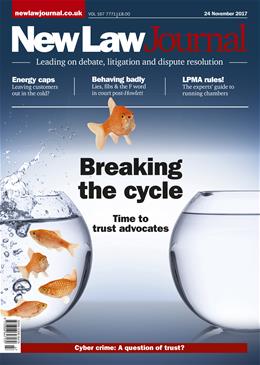
‘Cappuccino to declare’; Court of Protection Rules, OK?; Shy on Fraud; New FPRs.
LPMA veterans Christine Kings & Edith Robertson (share a master class in practice management with John van der Luit-Drummond
Robin Barclay explains why the cyber fraud landscape is on par with the Libor & Forex scandals
Costs follow the event, except for respondents in the Court of Appeal who successfully resist permission to appeal, as Clive Freedman QC explains
Claims & counter claims: Miranda Mourby, Stergios Aidinlis & Hannah Smith review the progress of the Data Protection Bill
Could a cap on gas & electricity harm customers in the long run? Christopher Bisping & Dr Timothy J Dodsworth report
Disaffected citizens prepared to run riot are nothing new, says Geoffrey Bindman
Post-Howlett, defendants will relish the latitude provided to them, but claimants will be less content, says Dominic Regan
Andrew Langdon QC reflects on the adverse effect of judicial case management on advocacy
MOVERS & SHAKERS

Freeths—Ruth Clare
National real estate team bolstered by partner hire in Manchester

Farrer & Co—Claire Gordon
Partner appointed head of family team

mfg Solicitors—Neil Harrison
Firm strengthens agriculture and rural affairs team with partner return







